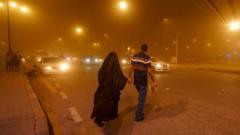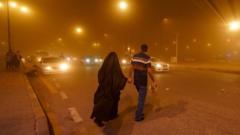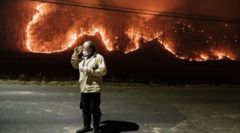The country is struggling with increasing dust storms, posing significant health risks as climate change may worsen these conditions.
**Iraq Faces Health Crisis Amid Severe Sandstorm**

**Iraq Faces Health Crisis Amid Severe Sandstorm**
A sandstorm in Iraq has left over a thousand individuals grappling with respiratory issues.
In a recent sandstorm that swept through central and southern Iraq, more than a thousand people have reported severe respiratory problems, leading to a dire public health situation. Health authorities in Muthanna province indicated that they had recorded at least 700 cases of suffocation due to the rapidly deteriorating air quality. Dramatic footage circulating on social media showcased a stark orange haze blanketing urban areas.
The storm not only sparked health concerns but also disrupted daily life. Local media reports indicate widespread power outages and grounded flights in several regions. The intensity of these dust storms has raised alarms among experts, who suggest they're becoming increasingly frequent due to climatic shifts.
The Iraqi environment ministry has explicitly warned that the nation should brace for a rise in the number of "dust days" in the coming years, while health professionals reported the use of face masks became essential for pedestrians and law enforcement officers alike. The situation required a robust emergency response, with paramedics mobilized to aid individuals struggling to breathe.
Hospitals reported a surge of patients affected by the storm; Muthanna alone saw over 700 cases, while Najaf and Diwaniyah provinces reported 250 and 322 patients respectively. The health system has been overwhelmed, with at least 530 individuals from Dhi Qar and Basra provinces seeking medical assistance.
The sandstorm brought visibility down to less than one kilometer, forcing authorities to temporarily close airports in Najaf and Basra, further illustrating the impact of natural disasters on the nation’s infrastructure. According to local weather services, some relief is expected, with conditions projected to stabilize by Tuesday morning.
This sandstorm serves as a prevalent reminder of Iraq's vulnerability to climate change, as the country grapples with escalating dust storms, extreme heat, and water scarcity. Historical data indicates a severe sandstorm last year resulted in one death and over 5,000 additional cases of respiratory distress, highlighting the urgent need for comprehensive climate action.
The storm not only sparked health concerns but also disrupted daily life. Local media reports indicate widespread power outages and grounded flights in several regions. The intensity of these dust storms has raised alarms among experts, who suggest they're becoming increasingly frequent due to climatic shifts.
The Iraqi environment ministry has explicitly warned that the nation should brace for a rise in the number of "dust days" in the coming years, while health professionals reported the use of face masks became essential for pedestrians and law enforcement officers alike. The situation required a robust emergency response, with paramedics mobilized to aid individuals struggling to breathe.
Hospitals reported a surge of patients affected by the storm; Muthanna alone saw over 700 cases, while Najaf and Diwaniyah provinces reported 250 and 322 patients respectively. The health system has been overwhelmed, with at least 530 individuals from Dhi Qar and Basra provinces seeking medical assistance.
The sandstorm brought visibility down to less than one kilometer, forcing authorities to temporarily close airports in Najaf and Basra, further illustrating the impact of natural disasters on the nation’s infrastructure. According to local weather services, some relief is expected, with conditions projected to stabilize by Tuesday morning.
This sandstorm serves as a prevalent reminder of Iraq's vulnerability to climate change, as the country grapples with escalating dust storms, extreme heat, and water scarcity. Historical data indicates a severe sandstorm last year resulted in one death and over 5,000 additional cases of respiratory distress, highlighting the urgent need for comprehensive climate action.





















